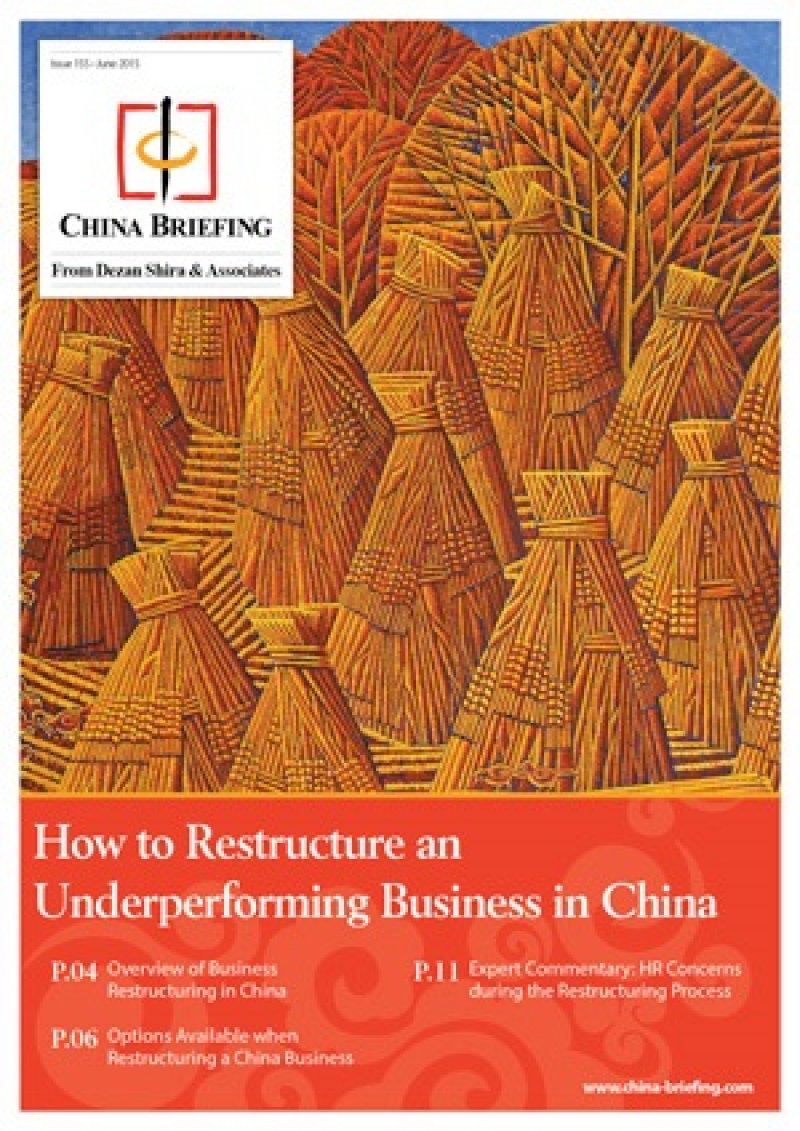China Regulatory Brief: Simplified Company Deregistration Procedure, New Food Business License
Simplified Company Deregistration Procedures Expanded to Seven Regions
China has recently expanded its simplified company deregistration policy to seven provinces and cities including Shanghai Pudong District, Tianjin, Inner Mongolia, Shenzhen, Ningbo and Zhejiang province. Companies that are registered in these areas and have not started operation or have started operation but already settled all of their claims and debts are now allowed to apply to the local Administration for Industry and Commerce (AIC), and complete deregistration procedures within a shorter period. Under the simplified deregistration procedures, companies will no longer have to submit the liquidation report and make the announcement of the company’s deregistration on certain newspapers designated by the AIC.
In China, the procedures for closing a wholly foreign-owned enterprise (WFOE) – its dissolution and liquidation – are no easier or shorter than the process of setting up such a company, and normally take between 12 to 14 months to complete.
CFDA Releases Detailed Rules on Food Business License
On September 30, China’s Food and Drug Administration (CFDA) released detailed rules on the country’s new Food Business License, indicating China’s increasing scrutiny on investors engaged in the food industry. Starting October 1, 2015, the new Food Business License is fully implemented nationwide, while the previous Food Distribution License and the Catering License will no longer be issued separately. The rules clarified certain criteria that investors need to meet to open a restaurant in China, as well as the requirements on the business location for the operation. Additional restrictions have been put on homemade food and drinks.
![]() RELATED: Business Advisory Services from Dezan Shira & Associates
RELATED: Business Advisory Services from Dezan Shira & Associates
China to Reduce the Trademark Registration Fee
On October 9, the State Administration for Industry & Commerce Trademark Office announced its decision to reduce the registration fee of trademarks. Starting October 15, the trademark registration fee will be slashed down from the current RMB 800 (limited to 10 commodities falling under one category; where the company’s commodities exceed 10, an extra RMB 80 will be charged on each additional commodity) to RMB 600 (limited to 10 commodities falling under one category; in the case of more than 10 commodities, another RMB 60 will be charged on each additional commodity).
Overseas Central Banks Permitted to Enter China’s Interbank Market
On September 30, the People’s Bank of China issued the “Announcement [2015] No.31,” which clarifies issues concerning permitting overseas central banks to enter China’s interbank foreign exchange market. According to the Announcement, overseas central banks may enter China’s interbank foreign exchange market in three ways: a) through the People’s Bank of China; b) through a member of China’s inter-banking foreign exchange market; and c) becoming a member of China’s inter-banking foreign exchange market directly. The overseas central banks may carry out various foreign exchange transactions including spot, forward, swap and option transactions by means of inquiry and matching up services without any restrictions on the amount.
|
Asia Briefing Ltd. is a subsidiary of Dezan Shira & Associates. Dezan Shira is a specialist foreign direct investment practice, providing corporate establishment, business advisory, tax advisory and compliance, accounting, payroll, due diligence and financial review services to multinationals investing in China, Hong Kong, India, Vietnam, Singapore and the rest of ASEAN. For further information, please email china@dezshira.com or visit www.dezshira.com. Stay up to date with the latest business and investment trends in Asia by subscribing to our complimentary update service featuring news, commentary and regulatory insight. |
![]()
How to Restructure an Underperforming Business in China
In this issue of China Briefing magazine, we explore the options that are available to foreign firms looking to restructure or close their operations in China. We begin with an overview of what restructuring an unprofitable business in China might entail, and then take an in-depth look at the way in which a foreign company can go about the restructuring process. Finally, we highlight some of the key HR concerns associated with restructuring a China business.
 China Retail Industry Report 2014
China Retail Industry Report 2014
In this special edition of China Briefing, we provide an overview of the retail industry in China and the procedures for setting up a retail shop, focusing specifically on brick-and-mortar physical retail stores. Further, we have invited our partner Direct HR to offer some insights on the talent landscape in the retail industry, as well as tips for recruiting retail personnel in China.
 Industry Specific Licenses and Certifications in China
Industry Specific Licenses and Certifications in China
In this issue of China Briefing, we provide an overview of the licensing schemes for industrial products; food production, distribution and catering services; and advertising. We also introduce two important types of certification in China: the CCC and the China Energy Label (CEL). This issue will provide you with an understanding of the requirements for selling your products or services in China.
- Previous Article Erhöhung des registrierten Kapitals in China
- Next Article The Third Road to China: Foreign-invested Partnerships











